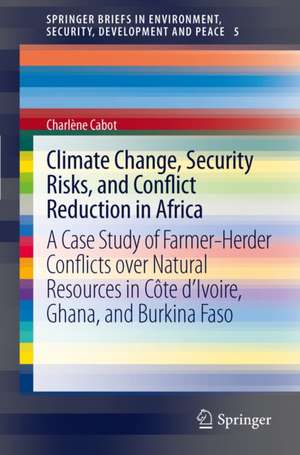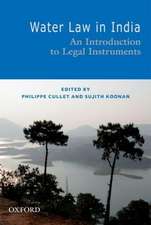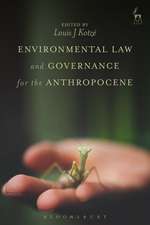Climate Change, Security Risks and Conflict Reduction in Africa: A Case Study of Farmer-Herder Conflicts over Natural Resources in Côte d’Ivoire, Ghana and Burkina Faso 1960–2000: Hexagon Series on Human and Environmental Security and Peace, cartea 12
Autor Charlène Caboten Limba Engleză Hardback – 2 noi 2016
| Toate formatele și edițiile | Preț | Express |
|---|---|---|
| Paperback (1) | 643.99 lei 6-8 săpt. | |
| Springer Berlin, Heidelberg – 29 iun 2018 | 643.99 lei 6-8 săpt. | |
| Hardback (1) | 590.69 lei 38-44 zile | |
| Springer Berlin, Heidelberg – 2 noi 2016 | 590.69 lei 38-44 zile |
Preț: 590.69 lei
Preț vechi: 738.36 lei
-20% Nou
Puncte Express: 886
Preț estimativ în valută:
113.04€ • 117.58$ • 93.32£
113.04€ • 117.58$ • 93.32£
Carte tipărită la comandă
Livrare economică 10-16 aprilie
Preluare comenzi: 021 569.72.76
Specificații
ISBN-13: 9783642292361
ISBN-10: 3642292364
Pagini: 50
Ilustrații: XXXIV, 190 p. 36 illus., 30 illus. in color.
Dimensiuni: 210 x 279 x 18 mm
Greutate: 0.9 kg
Ediția:1st ed. 2017
Editura: Springer Berlin, Heidelberg
Colecția Springer
Seria Hexagon Series on Human and Environmental Security and Peace
Locul publicării:Berlin, Heidelberg, Germany
ISBN-10: 3642292364
Pagini: 50
Ilustrații: XXXIV, 190 p. 36 illus., 30 illus. in color.
Dimensiuni: 210 x 279 x 18 mm
Greutate: 0.9 kg
Ediția:1st ed. 2017
Editura: Springer Berlin, Heidelberg
Colecția Springer
Seria Hexagon Series on Human and Environmental Security and Peace
Locul publicării:Berlin, Heidelberg, Germany
Public țintă
ResearchCuprins
From the Contents: Part 1: The climate induced Degradation and increased Scarcity of Resources as Factors challenging security.- Introduction into current Climate Change, Conflict Concerns and Farmer-Herder Conflicts.- Literature Review: Causal Linkages between Environmental Change and Conflict.- Part 2: Theoretical Background: The Importance of Political Factors in a precarious Human and Environmental Security challenged by global, regional and local Environmental Changes.- Theoretical Prisms: Human and Environmental Security and Conflict Reduction.- The Role of Political Factors in Undermining or Maintaining Environmental and Human Security in a context of Climate Change.- Part 3: Case Study: Farmer-Herder Conflicts in Burkina Faso, Côte d’Ivoire and Ghana.- Background Information.- Methodological Approach to the Case Study.- Study of the three Research Hypotheses in the three selected Countries.
Notă biografică
CharlèneCabot (born 1988 in France) completed her undergraduate studies in Politicaland Social Sciences at Sciences Po Paris and at the University of Sydney. MsCabot subsequently obtained a double Master’s degree in International Relationsfrom Sciences Po Paris and the Free University of Berlin with a major inSustainable Development and Environmental Politics (2011). Ms Cabot joined the United Nations World Food Programme(WFP) in December 2011. After working inGermany, Senegal, the Central African Republic, Cameroon, and in the Policy andProgramme Division at WFP headquarters, she is currently based in N’Djamena (Chad).
Textul de pe ultima copertă
The environmental impacts of climate change represent challenges to the societies and are anticipated to contribute to the destabilization of their human security, endangering ways of life of human-beings and inducing conflicts. Vulnerable societies are likely to see a surge in conflicts and violence happen. However social, economic and political circumstances mediating environmental changes are fundamental and determine whether the societal challenge will be a conflictive one.
In Western Africa, major environmental changes are expected and the region hosts especially vulnerable population groups (i.e. herders and farmers). Political factors might contribute to determining the occurrence, escalation or reduction of conflict between those groups. The influence of integration policies, of the fairness of land tenure, and of decentralization and participation possibilities on conflicts is studied in Côte d’Ivoire, Ghana and Burkina Faso.
In Western Africa, major environmental changes are expected and the region hosts especially vulnerable population groups (i.e. herders and farmers). Political factors might contribute to determining the occurrence, escalation or reduction of conflict between those groups. The influence of integration policies, of the fairness of land tenure, and of decentralization and participation possibilities on conflicts is studied in Côte d’Ivoire, Ghana and Burkina Faso.
Caracteristici
Thorough introduction to key concepts on the links between climate change and conflicts Work provides practical approach: how can politics and policies help reduce climate conflicts Work focus on a vulnerable region (Western Africa) where more information is needed to face the upcoming challenge Includes supplementary material: sn.pub/extras

























